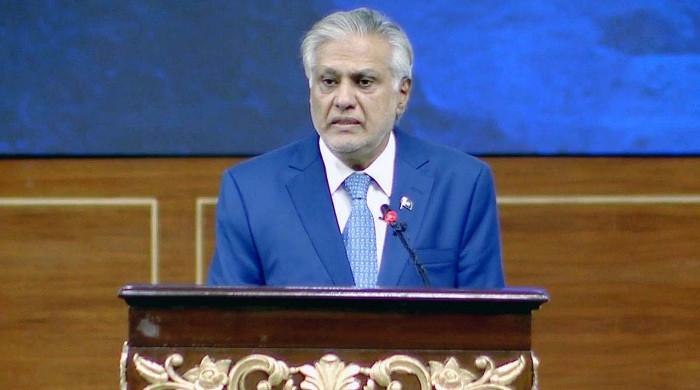Pakistan Ready for Dialogue with India, Emphasizes Comprehensive Approach
Deputy Prime Minister and Foreign Minister Ishaq Dar stated that Pakistan is prepared to engage in discussions with India, though not fervently seeking them. He highlighted the necessity for a thorough dialogue encompassing terrorism and fundamental issues, notably the Indus Waters Treaty.
During a press briefing held in Islamabad on Wednesday, Dar asserted that any attempts by India to impede or reroute Pakistan’s water supply would be construed as an act of aggression. He underscored that the Indus Waters Treaty is protected under international law from suspension or amendment.
India had previously made a unilateral declaration to suspend the treaty amidst various actions following an attack on tourists in Pahalgam, within Indian Illegally Occupied Jammu and Kashmir (IIOJK), which New Delhi attributed to Islamabad.
Moreover, India initiated unprovoked missile firings into Pakistani territory, alleging that the strikes aimed at “terrorist outposts,” which, however, led to several non-combatant casualties, including women and children, alongside some Pakistani military personnel.
Subsequently, Pakistan responded with precise strikes targeting Indian defense infrastructure, resulting in a brief yet intense conflict between the two nuclear-equipped nations, marking a significant escalation in decades.
The Pakistan Air Force reportedly shot down a number of Indian fighter aircraft during the conflict.
An armistice, brokered by the United States, concluded the period of intense fighting; however, relations between the two neighboring countries deteriorated to a nadir.
Dar mentioned that the ceasefire between the two nations is currently holding. He also criticized Indian political figures for intensifying their rhetoric in anticipation of their general elections. He commented that India’s purported “new normal” has failed, and the global community has observed the undermining of its claims to dominance during the recent clash with Pakistan.
Dar revealed Pakistan’s downing of six Indian fighter jets and one unmanned aerial vehicle (UAV), attracting considerable global attention. He added that Pakistan’s military response garnered international recognition, and notably, its diplomatic efforts were acknowledged worldwide, even eliciting criticism from within India.
As part of the diplomatic initiative, Dar mentioned that a delegation, headed by Pakistan Peoples Party’s Bilawal Bhutto Zardari, was dispatched to the United States, the United Kingdom, and the United Nations.
The former foreign minister is leading a delegation across multiple nations to communicate Pakistan’s perspective on the recent military encounter with India and to contest New Delhi’s narrative on an international scale.
According to Dar, the delegation conveyed that Pakistan’s stance received a positive reception at all levels.
He further stated that Prime Minister Shehbaz Sharif conducted visits to Turkiye, Iran, Azerbaijan, and Tajikistan to express gratitude for their support during the conflict and is slated to visit the Kingdom of Saudi Arabia soon for the same intent.
Dar also announced that Pakistan will undertake the presidency of the United Nations Security Council next month. Discussions during Pakistan’s presidency will be centered around the theme: Fostering International Peace and Security via Multilateralism and Peaceful Resolution of Conflicts.



Comments (0)
No comments yet. Be the first to comment!
Leave a Comment